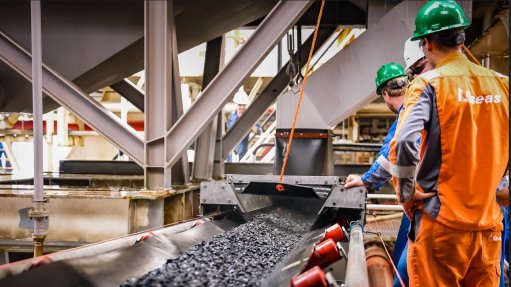
Nodules being inspected
Nasdaq-listed critical minerals company TMC on Wednesday announced the successful production of cobalt sulphate derived exclusively from seafloor polymetallic nodules.
The milestone was achieved during bench-scale testing of TMC’s hydrometallurgical flowsheet design in collaboration with SGS Canada at its Metallurgical Centre of Excellence in Lakefield, Ontario.
The production of cobalt sulphate follows TMC's earlier success in producing nickel sulphate from seafloor polymetallic nodules, a key raw material for electric vehicle (EV) batteries.
Using samples of nickel/cobalt/copper matte produced in 2021, SGS tested TMC’s flowsheet, which processes high-grade nickel/copper/cobalt matte directly into high-purity cobalt sulphate without the need for cobalt metal production. This process also produces fertiliser byproducts, minimising solid waste or tailings.
“This achievement further demonstrates the potential for seafloor polymetallic nodules as a valuable resource,” stated TMC head of onshore development Jeffrey Donald.
Carlos Cordoba, VP of Natural Resources at SGS North America, highlighted in a media statement the importance of the development. “SGS is pleased to support TMC in achieving another milestone towards the commercialisation of polymetallic nodules for the battery chemicals market. Our expertise in extractive metallurgy is driving innovation, and we look forward to continuing our support throughout the mining project lifecycle.”
TMC's advancements align with increasing global demand for critical battery metals necessary for the energy transition. The company's NORI and TOML projects are ranked as the world’s largest undeveloped nickel projects, containing substantial quantities of nickel, cobalt, copper and manganese, sufficient to meet the needs of 280-million EVs.
Recent legislative and governmental actions have also highlighted the strategic importance of marine minerals. In May, the US Congress allocated $2-million to the Defense Department’s Industrial Base Policy Office to explore the feasibility of domestic nodule refining. In March, draft legislation was introduced in the House of Representatives advocating for US support for seafloor nodule collection, processing and refining.
TMC is also collaborating with Pacific Metals Corporation to conduct a feasibility study for processing 1.3-million tonnes a year of wet polymetallic nodules into high-grade nickel/copper/cobalt alloy and manganese silicate.